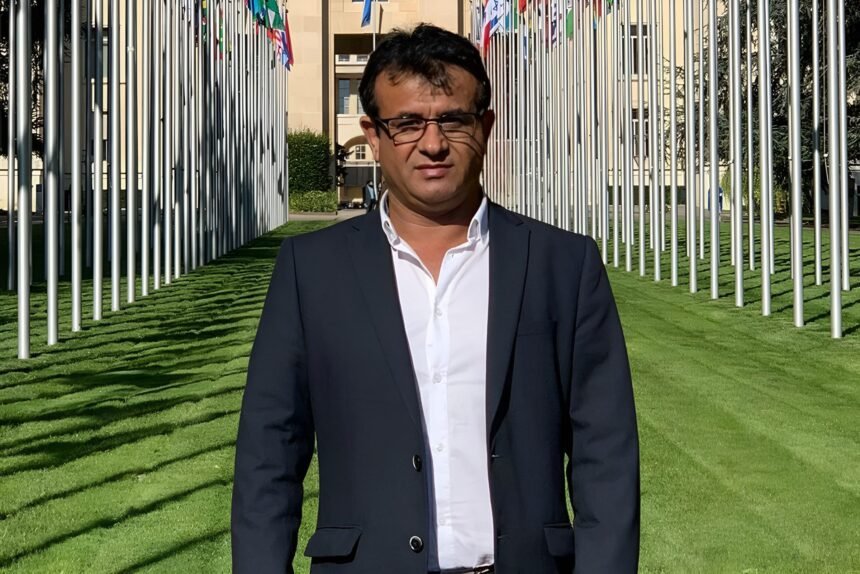In a recent statement, Dr. Naseem Baloch, the Chairman of the Baloch National Movement (BNM), expressed concern over the numerous challenges currently faced by the nation. Notably, the occupying state’s main priority seems to be preventing the Baloch nation from receiving education and undermining teachers who promote national and critical awareness in this field.
According to Dr. Naseem Baloch, occupying states consistently exhibit fear towards dialogue and critical consciousness. This apprehension stems from their recognition of the pivotal role dialogue and critical consciousness play in fostering innovative thinking that goes beyond societal norms imposed by traditional or occupying forces. The reluctance of occupying states to embrace crossing these set boundaries and exploring new pathways reflects their desire to maintain control and curb any divergence from their imposed ideologies.
Chairman Dr. Naseem Baloch strongly criticized the recent incident at Turbat University, where Professor Dr. Manzoor Baloch was prohibited from participating in a program. This incident serves as evidence of the state’s fear of engaging in dialogue. Professor Manzoor Baloch is known as a dedicated educator and a trailblazer in promoting critical consciousness among his students and within academic discussions. The program at Turbat University aimed to further promote the same goals. However, the administration of Turbat University, by succumbing to pressure from state institutions, violated Baloch’s values and academic traditions by barring the Baloch professor and his guest from participating. This action not only exhibited a lack of respect towards their fellow professionals but also undermined the fundamental principles associated with education and teaching.
He stated that international laws, particularly Article 13 of the 1976 United Nations Convention on Economic, Social, and Cultural Rights, explicitly protect the right to education. This provision emphasizes that individuals involved in education, whether through research, teaching, study, discussion, documentation, production, creation, or writing, are entitled to exercise their freedom to advance and disseminate knowledge and ideas without any form of state coercion. Professor Dr. Manzoor Baloch, being a distinguished scholar, plays a significant role in cultivating social consciousness through his teachings. Therefore, it is his legal right to investigate and discuss pertinent issues based on his expertise, presenting facts to the public. Unfortunately, colonial societies tend to be divided into hierarchical structures, often granting absolute authority solely to the ruling class. Consequently, basic human necessities such as education are unjustly denied to marginalized communities, while anyone attempting to address this imbalance is subject to humiliation. These injustices reflect the prevailing state policies. Conversely, individuals involved in perpetuating societal degradation are often shielded from accountability, exacerbating the deterioration of society.
Chairman Dr. Naseem expressed profound concerns, stating that the incident involving Dr. Manzoor Baloch is not an isolated event but rather a manifestation of a long-standing policy of cultural genocide and educational genocide in Balochistan pursued by the state. These actions, contrary to universal and humanitarian values, include the unjustifiable banning of book fairs and the deliberate hindrance of scholar-student interactions. Recent instances of book fair bans at Dera Ghazi Khan and Turbat universities reinforce the alarming state of education, where institutions increasingly resemble military camps and cantonments rather than centers of learning. Shockingly, in Balochistan, numerous schools and colleges have been seized and repurposed as military encampments, depriving the local population of their right to education for prolonged periods. This detrimental trend persists as part of an overarching state policy, while those responsible for malevolent activities within society remarkably evade accountability, exacerbating the prevailing degradation.
He elaborated on the crucial role of knowledge in fostering human consciousness, as it enables the abandonment of outdated traditions and ideas. However, he noted that colonial powers have historically attempted to impede the dissemination of knowledge. This disturbing policy of occupation, specifically targeting Balochistan, has been evident since its inception. Nevertheless, today, through the power of social media, the voice of resistance in Balochistan is reaching global audiences. Disturbing practices like profiling students, covert surveillance through secret cameras, book bans, enforced disappearances, and the tragic loss of students and teachers, all represent components of the state’s deliberate strategy to systematically limit educational opportunities for the Baloch nation.


